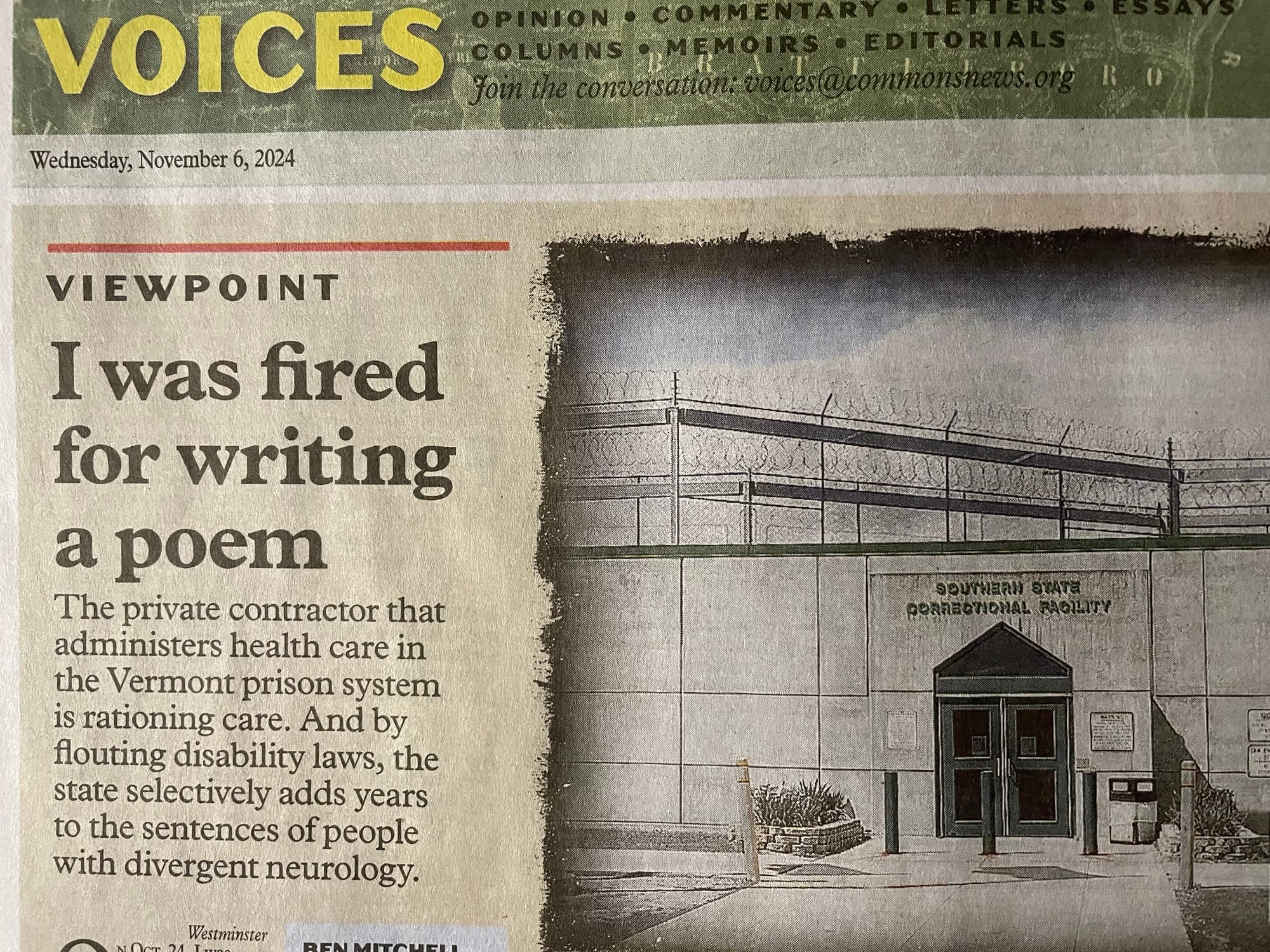I Was Fired For Writing A Poem

The Commons - Wednesday, November 6, 2024 — Issue 789
-- Ben Mitchell
On Oct. 24, I was fired by the Vermont Department of corrections for having written a poem: Elegy to Gary Partridge. Partridge was a student of mine at Southern States Correctional Facility who died in September from an infection he had had for over a year. I hadn't published the elegy or shared it with the public in any way, but I read it to the prison's creative writing class, and that was enough. Certainly this begs the question: what is so threatening in what I wrote?
At first glance, it would appear my offensive theme was the suggestion that WellPath, the private contractor who took over healthcare in the Vermont prison system last year, is rationing care in such a way that leads to unnecessary death. However, there is no question that that is certainly the case. When Governor Phil Scott and Commissioner Nicholas J. Deml hired Wellpath, they were aware of WellPath's long history of denying care in ways that lead to death. Senator Elizabeth Warren is leading a congressional investigation into Wellpath as I write this: squeezing profit at the expense of patient care is the Wellpath brand.
In my opinion, the truly threatening aspect of what I wrote is the suggestion that Risk Intervention Services and the "Clinical Services" model currently practiced in VT is being used to systematically violate the Americans with Disabilities Act. The Elegy exposes the way Risk Intervention Services uses their clinical tools to selectively add years to the sentences of people with divergent neurology.
According to their materials, "Risk Intervention Clinical Services employs Evidenced Based Principles for working effectively with offenders … on coping skills, substance abuse, offense specific situations, anger and aggression, and healthy relationship skill development." The "Clinical Services" described boil down to a series of photocopied self reflective exercises used to determine an individual's likelihood to "reoffend." These services are then used to decide who can take advantage of programs like good time, early release, porol and probation which include support for housing and employment.
Over the summer of 2023, I noticed a pattern of incarcerated people with divergent neurology - Dyslexia, ADHD, Autism, being denied access to accommodations during "Clinical" programming. I witnessed a number of hyperactive students - not allowed medication - being thrown out of programming for executive function challenges and restlessness. Furthermore, I saw incarcerated individuals on the Autism spectrum penalized for their social pragmatics.
In one particularly frustrating instance, a dyslexic man who could not read the xeroxed forms had requested several times to be allowed accommodations under the Americans with Disabilities Act. His lack of reading had led him to fail programming in the past. When time came, he told them he did not feel comfortable to start programming without accommodations for his reading. Rather than helping this individual gain the requested accommodations, guaranteed by federal law, the service provider documented the individual as "refusing court mandated programming" thus adding two years to his sentence. His request for reasonable accommodations increased his sentence.
Let's dig a little deeper into the "Clinical" system practiced by VT DOC. If an incarcerated person is not accomplishing the goals of the "Clinical" programming, they create a Corrective Action Plan or CAP. A CAP is a list of specific steps the individual must take to address their shortcomings. The CAP is the system by which incarcerated individuals can be removed from programming. When I went through the entire list of incarcerated individuals who had been placed on CAPs statewide, I found some alarming statistics. 60% of Individuals on CAPs had a history of special education. Even more alarming however was that of that 60% only 12% had any kind of ADA accommodations noted in their file. Of those 12% I could not find one who had received any kind of accommodations during programming.
At that time, I shared these statistics with my supervisor, who brought them to the attention of Risk Intervention Services. My hope was that we could find a way to help incarcerated individuals with divergent neurology, better access the programming that was supposed to help them reduce their chances of recidivism. Since that time, however, the ADA and 504 processes have been taken over by an administrator with no background in special education who is removing information from the records.
One particularly glaring example is an individual who is exceptionally bright, but has deficits in reading, math, spelling and social pragmatics. This individual was homeschooled, so he has no school records or formal diagnosis. After being thrown out of programming twice, a team of special educators wrote a 504 plan to help explain his sometimes bizarre, interpersonal behavior to the service providers. Rather than address the accommodations suggested in the 504, an administrator deleted the 504 from the system. Someone has decided to keep him in incarcerated as long as possible. Rather than allowing him to go through the system which would provide support for re-entry into the community, he will hit his maximum and get dropped at the bottom of the driveway.
So, am I saying that the Vermont Department of Corrections is systematically executing autistic people? No. The evidence is correlational at best. I am saying, however, that being neuro-divergent significantly increases your likelihood of dying in prison in Vermont.
